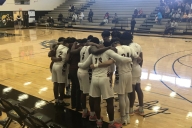You have /5 articles left.
Sign up for a free account or log in.
The National Collegiate Athletic Association announced Thursday that it had placed Georgia Southern University on two years’ probation after finding that two former staff members committed academic fraud for three football players.
In a statement Thursday, the university noted that the violations were self-reported and that Georgia Southern self-imposed most of the resulting penalties. “Institutional checks and balances promptly detected the actions of these rogue former employees, despite their efforts to hide what they knew to be policy violations,” the university stated.
While it’s common for institutions to place the blame on a few “rogue former employees,” the case at Georgia Southern is only the most recent example of what critics and other observers of big-time college sports call an epidemic of academic fraud. In the last two years, more than a half dozen NCAA institutions have committed academic misconduct, and the association says it is investigating another 20 for similar violations.
An analysis by Inside Higher Ed of the association’s major infraction database found that the NCAA has punished Division I institutions at least 15 times for academic fraud in the last decade.
“It's an epidemic and a problem that will continue until faculty take control of their campuses,” said David Ridpath, a professor of sports administration at Ohio University and an advocate for reforming the academic side of college sports. “This can be changed, but we simply have to want to do it. This will not stop until we define what we are: professional sports being played in the higher ed space or a cocurricular activity played by students?”
Earlier this year, the NCAA's Division I Council adopted new rules designed to update its academic integrity policies for the first time since 1983.
Colleges must now “maintain and adhere to written academic integrity policies that apply to the entire student body.” If a college breaks its own rules, the NCAA would consider that to be a case of “academic misconduct.” At the same time, the new rule redefines “impermissible academic assistance” as “academic conduct involving a staff member or booster that falls outside of a school’s academic misconduct policies, provides a substantial impact on the student-athlete’s eligibility and is not the type of academic assistance” generally available to all students.
“The legislation aims to strike an appropriate balance between a school administration’s role in deciding academic integrity issues on campus and the NCAA’s collective role in reinforcing and upholding the NCAA’s core academic principles,” the association said.
Two teams whose academic misconduct helped lead to the new guidelines met in this year’s Final Four of the NCAA men’s basketball tournament: the University of North Carolina at Chapel Hill and Syracuse University.
In 2005, following a season of poor academic performance from his players, Syracuse’s head basketball coach, Jim Boeheim, hired a new director of basketball operations and gave him an imperative: “fix” the academic problems of his athletes. The new director’s solution, according to the NCAA, was for athletics staff members to access and monitor the email accounts of several players, communicate directly with faculty members as if the staff members were the athletes and then complete course work for them. In one case, an athlete had his eligibility restored by turning in a paper to raise a grade he had earned the previous year.
The paper was written by the director and a basketball facility receptionist.
The fraud finally came to light last year after a lengthy series of investigations by the university and the NCAA. Syracuse self-imposed a postseason ban last year, and then the NCAA announced a number of sanctions against the university, including vacating more than 100 of Boeheim’s wins and suspending him for nine conference games this past season.
The fraud at University of North Carolina lasted much longer. For 18 years, some employees at UNC Chapel Hill knowingly steered about 3,000 students -- 1,500 of them athletes -- toward “paper courses” that never met, were not taught by any faculty members and in which the only work required was a single research paper that received a high grade no matter the content.
Roy Williams, the men’s basketball coach, maintains he was not aware of the fraud. “We had a problem,” Williams said ahead of the Final Four game. “We're embarrassed, we're mad, we're ticked off about what happened. We know men's basketball had nothing to do with it and we're very proud about that.”
Yet the majority of those in the know were academic advisers to men's basketball and football players, the latter group of which made up more than half of the athletes taking the courses, according to a report the university released in 2014. In television interviews that year, a former player under Williams -- a member of his 2005 championship team -- said players enrolled in the paper courses and that the head coach was aware of the fraud.
That year, when the team won the NCAA tournament, UNC men's basketball players accounted for at least 35 enrollments in the phony courses, according to the university. Over all, men's basketball players accounted for more than 12 percent of all athletes taking the courses. The NCAA is still mulling how to punish the university.
The association's Division I Committee on Infractions has had its hands full in the last year dealing with other recent cases of fraud.
In June 2013, a former assistant men’s basketball coach at Southern Methodist University determined that an athlete he recruited to the team needed to take a summer course to meet NCAA eligibility standards. The assistant coach met with the athlete and his mother and encouraged the incoming freshman to enroll in an online course. Soon after the athlete enrolled in the online course, he met an administrative assistant in the men’s basketball office, who “took an interest in his life and academic work,” according to the NCAA's report. In July 2014, the assistant obtained the athlete’s username and password for his online summer course, as well as for his email account.
She completed all of the athlete’s assignments and exams, earning him an A-minus grade. Last year, the NCAA placed Southern Methodist’s basketball program on three-year probation and banned the team from postseason play as punishment.
Online courses were also at the center of academic fraud found by the NCAA at Weber State University in late 2014. A year earlier, a math instructor began completing course work for five football players -- including tests, quizzes and a final exam -- by logging in to the athletes’ profiles in an online math course.
In the most recent case at Georgia Southern, according to the NCAA, a former assistant compliance director gave an athlete a flash drive containing her work from when she was enrolled in the same course. The athlete later pulled an assignment from the flash drive and submitted the work as if it were his own.
A former assistant director of student-athlete services at the university also wrote and submitted 10 extra credit assignments for two football players. She obtained the players’ log-in information and submitted the assignments without the athletes’ knowledge. The players still failed those courses. Georgia Southern faced a similar scandal in 2010, when a former assistant coach and director of men’s basketball operations completed course work for two basketball players. The fraud included writing essays, taking tests and participating in required online chats for the athletes.
In the NCAA report released Thursday, the Committee on Infractions noted that since 2014, at least three institutions have violated NCAA rules when an institutional staff member performed academic work for a current or incoming athlete. When asked if the association was concerned by the large number of fraud cases in recent years, Greg Sankey, chair of the NCAA’s Division I Committee on Infractions and commissioner of the Southeastern Conference, pointed reporters to that section of the report.
“Whether one quantifies the number of cases as simply the three listed, plus the one today, or by identifying others, I think I can say on behalf of the committee that every one of these cases is troubling,” Sankey said. “We have high expectations, and those are noted in this report and in others, and people in leadership roles need to fulfill those obligations.”
The three institutions mentioned in the report include Southern Methodist, Weber State and the University of Southern Mississippi.
The NCAA determined earlier this year that Southern Mississippi had committed academic fraud. For two years, the former head men’s basketball coach directed his staff to travel to where prospective athletes lived so they could assist the players with their course work. The recruits, all students at two-year institutions, were struggling to earn the necessary academic credentials to transfer to Southern Mississippi and be immediately eligible to compete.
According to the NCAA, the assistants completed numerous assignments in several online courses for seven athletes. In one case, a recruit was such a weak student that his coach described him as “as far away from graduating as any kid I’ve ever had.” Yet when he took three online courses through another institution to become eligible at Southern Mississippi, his GPA for those courses was 3.75. According to the NCAA, one of the graduate assistants completed at least 20 math assignments in those courses.
In September 2013, the former head men’s basketball coach learned that a recruit needed two English courses and a math course in order to be eligible, but the student could not pay for them. The coach went to a pharmacy and purchased four prepaid $500 credit cards. He gave the cards to his graduate assistants, who then used them to pay the registration fees of the online courses. One of the graduate assistants completed 75 of the athlete’s online English assignments. The recruit later admitted that he did not register, pay for or complete any of the online courses.
That the fraud involved students who were not yet enrolled in the university and courses not offered at the institution demonstrated how the pressures of big-time college athletics can breed academic impropriety far beyond the walls of the offending campus. Three months earlier, the NCAA concluded that a former assistant football coach at the University of Louisiana at Lafayette had made arrangements with the head of a Mississippi testing center to falsify the ACT scores of players and recruits.
“This thing has tentacles,” Ridpath, of Ohio University, said at the time. “That’s been proven over and over again. High schools, testing sites, junior colleges -- the corruption trickles down from the universities and affects all levels of education.”
In May, the University of Mississippi announced that the same assistant coach had pulled the same scam when he was an assistant coach for Mississippi's football team in 2010. In addition, the university said that an assistant women’s basketball coach and the women’s basketball director of operations signed up for several online courses on behalf of two prospective players who were still enrolled at two-year institutions. The pair paid for the courses and completed homework assignments, papers, quizzes and exams for the recruits.
Amy Perko, executive director of the Knight Commission on Intercollegiate Athletics, said it's up to colleges to make sure that an increasing pressure to succeed both on the field and in the classroom does not create the kind of employees who are desperate enough to resort to fraud.
"The uptick in academic fraud cases underscores the importance of creating a culture of academic integrity for the entire athletics program," Perko said.








